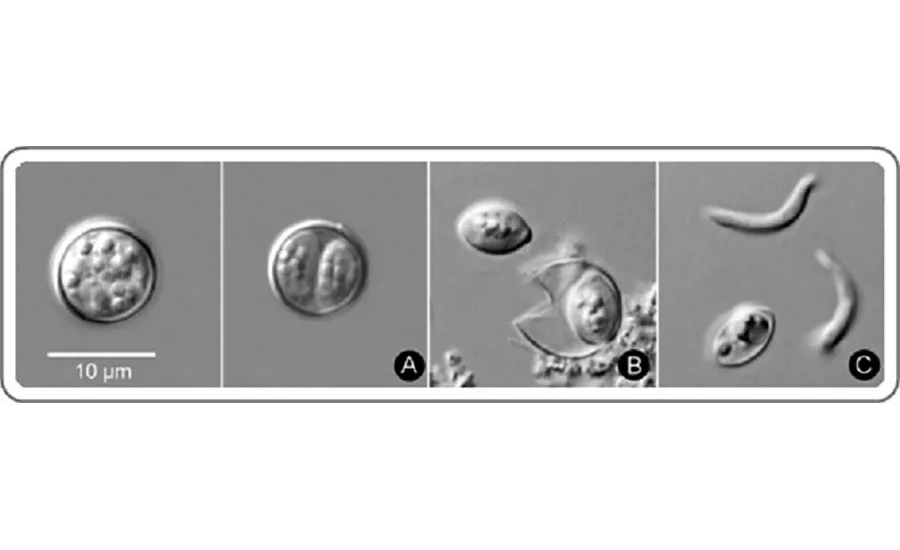FDA investigates more Cyclospora outbreaks

People become infected with Cyclospora by consuming food or drinking water contaminated with the parasite, which is endemic in countries with poor sanitation. An unsporulated Cyclospora oocyst, with undifferentiated cytoplasm, is shown (far left), next to a sporulating oocyst that contains two immature sporocysts (A). An oocyst that was mechanically ruptured has released one of its two sporocysts (B). One free sporocyst is shown as well as two free sporozoites, the infective stage of the parasite (C).
Photo courtesy of: CDC/DPDX
Though Cyclospora outbreaks in the US happen less frequently than those caused by typical pathogens (e.g., E. coli O157:H7, Salmonella and Listeria), the recent salad mix outbreaks occurring in July and August of this year have a familiar ring. Maybe call it déjà vu, but FE reported in July 31, 2013, on an eerily similar scourge in a news item entitled “Cyclospora outbreak traced to prepackaged salad mix.” Now, Cyclospora has FDA’s attention.
About 630 people from 25 states were infected, according to the CDC. Officials in Nebraska said the salad mix contained iceberg and romaine lettuce, red cabbage and carrots, and was sold via a national distribution chain. By the time the final tallies were made, the offending salad mixes were out of the supply chain.
According to FDA stats, an August 23, 2018, update showed that this summer’s Cyclospora infection afflicted people who consumed salads from McDonald’s restaurants. Though the investigation is still ongoing at press time, cases were reported in 15 states and New York City, resulting in 507 illnesses and 24 hospitalizations. Infections were reported in July and August 2018. FDA has been reviewing distribution and supplier information for romaine and carrots.
But McDonald’s salads weren’t the only product affected. On July 30, 2018, USDA’s FSIS issued a public health alert on beef, pork and poultry salad wrap products potentially contaminated with Cyclospora that were distributed by Caito Foods LLC, Indianapolis, IN, and having “best by” dates between July 15 and July 23, 2018. Caito Foods had received notification from Fresh Express that the chopped romaine in these products was being recalled.
On July 26, 2018, FDA completed final analysis of an unused package of Fresh Express salad mix containing romaine lettuce and carrots, which had been distributed to McDonald’s. The analysis confirmed the presence of Cyclospora in that sample, though the expiration date had already passed. McDonald’s stopped selling the salad at affected restaurants as Fresh Express had indicated that the salad mix with the carrots had only gone to McDonald’s.
Better analysis reveals more problems
Beginning in 2014, in an effort to be more proactive in spotting pathogens, FDA set up a new robust, risk-based preventive approach (called Microbiological Surveillance Sampling) to sampling assignments to assess microbial contamination in food commodities. Based on FSMA, FDA collects a statistically valid number of samples of targeted foods over a shorter period of time (12-18 months) to help identify common factors among positive findings. The sampling design takes into account the volume of the target food (imported or domestic) and the number of states/countries that produce the food to determine what US consumers are likely to find in the marketplace.
Commodities sampled to date under this approach include sprouts, whole fresh avocados, raw milk cheese, cucumbers and hot peppers. For fiscal 2018, FDA has been sampling fresh herbs (e.g., basil, parsley and cilantro) along with processed avocado and guacamole—with samples from domestic and imported sources. These tests have been applied to high-risk foods without a kill step in processing, and sampling assignments were developed to obtain baseline estimates of the prevalence of Salmonella and E. coli in these herbs.
Looking for quick answers on food safety topics?
Try Ask FSM, our new smart AI search tool.
Ask FSM →
In addition, FDA has added to its sampling assignment a new analytical test for the Cyclospora parasite, which has recently caused outbreaks in the US linked to produce—but the test also includes basil and cilantro. Cyclospora most likely occurs when these plants are grown under unsanitary conditions.
Results of this increased surveillance this past summer found two samples of cilantro to be imported into the US from Mexico, which tested positive for Cyclospora. In response, FDA refused entry for these shipments and has taken action to prevent contaminated cilantro from these producers to enter the US. As part of an effort under the FDA Produce Safety Partnership with Mexico, the two countries are working together to find the cause of the contamination.
Domestically, in July, FDA had a cilantro sample from a farm test positive for Cyclospora, and following an investigation took another sample, which also tested positive for the parasite. In response, FDA worked closely with state officials to recall and embargo the affected product. Though this is the first confirmed evidence of the presence of Cyclospora in domestic produce, the agency is not aware of any illnesses associated with the product, and trace-forward efforts didn’t indicate any connections between this domestic finding of contaminated cilantro and multistate outbreaks of Cyclospora investigated this past spring and summer.









